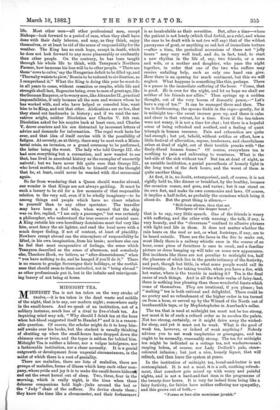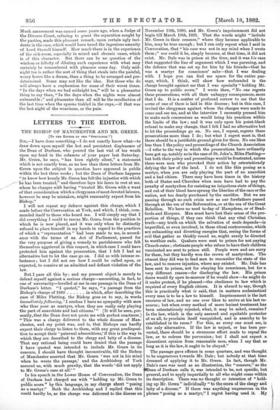MIDNIGHT TEA.
MIDNIGHT Tea is not tea taken on the very stroke of twelve,—it is tea taken in the dead waste and middle of the night, that is to say, our modern night; somewhere early in the small-hours. And we speak of an institution, not of a solitary instance, much less of a rival to five-o'clock tea. An inquiring mind may ask, " Why should I drink tea at the hour when hot-blood suggested itself to Hamlet P" and it is a reason- able question. Of course, the scholar might do it to keep him- self awake over his books, but the student is usually thinking of shutting up when the small-hours have dropped down the chimney once or twice, and the toper is seldom far behind him. Midnight Tea is neither a labour, nor a vulgar indulgence, nor a fashionable institution, nor a sheer necessity. It is a genial outgrowth or development from nngenial circumstances, in the midst of which there is a root of geniality.
There are maladies, there are lists of maladies, there are groups of maladies, forms of illness which keep each other com- pany, whose pride and joy it is to make the small-hours hideoulk and eat the sweet kernel out of sleep. Two, three, four in the morning, which is really night, is the time when these dolorous companions hold high - jinks around the bed or the " Judy " chair of the sufferer. No device cheats them ; they know the time like a chronometer, and their forbearance is as incalculable as their severities. But, after a time—where the patient is not lonely (which God forbid, as a rule), and where the case to be dealt with is not (we will say) that of the wildest paroxysms of gout, or anything so red-hot of immediate torture —after a time, the periodical accessions of these not " jolly hours " may very well tend, and do, in fact, tend, to start a new rhythm in the life of, say, two friends, or a man and wife, or a mother and daughter, who pass the night together, in order that one of the two who suffers may receive unfailing help, such as only one hand can give. Here there is an opening for much sentiment, but this we will neglect. What happens is something like this, perhaps. There is a pause in the immediate suffering of the hour. " Come, that is good. He is over for the night, and let us hope we shall see neither of his friends nor allies." Then springs up a sudden thought, out of the very bosom of domestic peace,—" Let's have a cup of tea!" It can be managed there and then. The tea is forthcoming, the spoons tinkle in the cups—gently, for it is midnight tea—the sweet incense goes up, and there is calm and cheer in that retreat, for a time. Even if the tea-takers were not weary, it is not a time for chat ; but there is a hopeful sense of being refreshed and soothed, and a feeling of quiet triumph in human resource. Pain and exhaustion are quite bad enough ; but yet, behold, without artifice or effort, how a little festival of alleviation, repose, tenderness, and cheerfulness arises at dead of night, out of their terrible pranks with "the finely-fibred human frame." Of course, everywhere tea is soothing to pain and enlivening to weariness. What is the bed-side of the sick without tea P But tea at dead of night, as an amiable institution, a genial parenthesis of homely light in the long tract of the dark hours, and the worst of them is quite another thing.
At first, it is, no doubt, extemporised, and, of course, it is not rigidly held to, like dinner or breakfast, by the healthy, because the occasion comes, and goes, and varies ; but it can stand on its own feet, and make its own ceremonies and laws. Of course, it implies a half-toilet, as probably the occasions which bring it about do. But the great thing is silence,—
" Still-born silence, thou that art
Floodgate of the deeper heart ;"
that is to say, very little speech. One of the friends is weary with suffering, and the other with nursing; the talk, if any, is very homely, and the " cleverness " confined to allusive phrases with light and life in them. It does not matter whether the rain beats on the roof or not, or what footsteps, if any, are to be heard outside. There are the faces in the fire to make out, most likely there is a railway whistle once in the course of an hour, some piece of furniture is sure to creak, and a familiar picture or dress hanging up will take on some new appearance. But incidents like these are not peculiar to midnight tea, half the pleasure of which lies in the gentle intimacy of the festivity, and part, though but little, in what some people would call its irrationality. As for taking trouble, when you have a fire, with hot water, where is the trouble in making it P Tea is the final cause of such things. And in all the whole realm of fairy-land, there is nothing less pleasing than those wonderful feasts which come of themselves. They are irrational, if you please ; but " making " tea is both rational and delightful. There could be no poetry and no refreshment of the higher order in tea turned on from a hose, or served up by the Wizard of the North out of inexhaustible taps, or by Mephistopheles in Anerbach's cellar.
The tea that is used at midnight tea must not be too strong,
nor must it be of such a refined order as to awaken the palate. Not too strong, certainly, or it might drive away the wished- for sleep, and yet it must not be weak. What is the good of weak tea, however, or indeed of weak anything P Nobody advises you to eat weak raspberries or greengages, and tea ought to be normally, reasonably strong. The tea for midnight tea might be indicated as a cottage tea, not washerwoman's rasping bohea, of course, nor Lady Dedlock's pale, straw- coloured infusion ; but just a nice, homely liquor, that will refresh, and then leave the system at peace.
In the institution of midnight tea, bread-and-butter is not contemplated. It is not a meal, it is a soft, soothing refresh- ment, that somehow gets mixed up with weary and painful nights, and is not a hard-and-fast item in the programme of the twenty-four hours. It is very far indeed from being like a fairy festivity, for fairies have neither suffering nor sympathy, and this grows out of both,- " Forsan et hex olim meminisse invabit."
Much amusement was caused some years ago, when a Judge of the Divorce Court, refusing to grant the separation sought by the parties., made this pleasant remark, upon certain ugly inci- dents in the case, which would have taxed the ingenious amenity of Lord Stowell himself. How much there is in the experience of the sick-room, especially in mixed and chronic cases, which is of this character. But there can be no question of the wisdom or felicity of diluting such experience with what may certainly be remembered with pleasure some day. Only mid- night tea is rather the sort of thing that steals into the painful, weary hours like a dream, than a thing to be arranged and pre- determined. Some may not like the idea. But those who do will always have a euphemism for some of their worst times. " In the days when we had midnight tea," will be a pleasanter thing to say than, "In the days when the nights were almost unbearable ;" and pleasanter than all will be the recollection of the last time when the spoons tinkled in the cups,—if that was the last night of the weariness, or the pain.



































 Previous page
Previous page